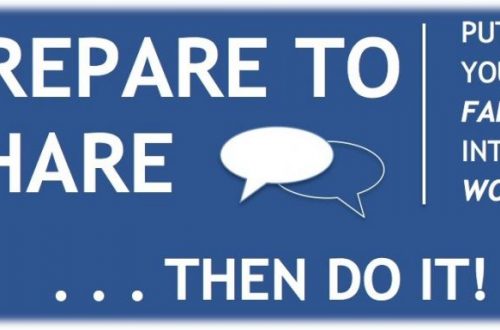Lies We Tell Our Children
I feel very reluctant to write about any parenting issue, because I was and am such an incredibly flawed parent. Nevertheless, I have learned things over the years that I am trying to put into practice during what remains of my parenting years. I’d like to share some of those things with you in the hope that you may find a glimmer of something practical that you could incorporate into your parenting.
It goes without saying that building into our kids spiritually is one of the biggest jobs we have as parents and perhaps one area where we may feel unsure. I’m not going to address that important area directly, but what I am going to address relates very closely to the spiritual development of our children. In my years of parenting, I have discovered that I have lied to my children about many basic life issues. I don’t mean that I have told them lies, but that I have communicated lies indirectly by my words, actions, and parenting style.
In his 1989 book, The Lies We Believe, Dr. Chris Thurman addresses six categories of lies that we, ourselves, may have believed—among these lies are lies about ourselves and lies about the way the world works. For example, we may believe in our heart of hearts that our lives should be easy, even though Scripture clearly speaks again and again about suffering. I would add another category of lies to Dr. Thurman’s six categories: lies we believe and tell to our children. Here are some lies I have at times told one or more of my children by my attitudes and actions:
- You shouldn’t have to suffer and I will make sure you don’t.
- I am responsible for your irresponsibility and bad decisions.
- Failure is bad and I am here to protect you from it.
Of course I never directly spoke the words of these lies to my children; so how was I communicating these lies to them? Well, I was treating my children as if all these things were true. Let me take each lie and give you some examples:
Lie #1-You shouldn’t have to suffer, and I will make sure you don’t. Obviously we have a responsibility as parents to protect our children from abuse and neglect. However from God’s perspective, suffering is an unavoidable ingredient in life; when responded to correctly, it leads to character development.
When one of my children was a toddler, I knew I needed to set limits, but his wails of protest unnerved me; so I would set limits, but I would also go to great lengths to make sure he was happy about the limits. For example, on one occasion, we were leaving the home of a family whose children my son enjoyed. Even with the proverbial five minute warning, my son howled in protest. I, Supermom, sprang into action. “Oh, _______, do you know what we are going to do when we get home? We’re going to have some cookies. Oh and your favorite cartoon comes on in half an hour. Let’s hurry so we can be there for it . . .” Usually after about five minutes of enthusiastic coaching, I could get my son out the door with a smile on his face. I was exhausted; he was smiling; he had just avoided having to learn that life involves doing some things we don’t like.
I also tried to protect my children from uncomfortable situations, even those which might be helpful to them, in the end. For example, I rarely took my children on visits with neighbors, because I didn’t think they would enjoy them. It’s true that they might have been uncomfortable—in fact, all of us might have been uncomfortable at times (including, perhaps, our hosts)—however I deprived my boys of some learning opportunities and long-term growth, primarily to protect them from doing things I thought they might not enjoy.
What did I teach my sons by such interactions and decisions? I taught them that they didn’t have to do things until they were happy to do them. You know, if it feels good, do it; if it doesn’t feel good, don’t do it. I told them the lie that they should not have to suffer, and that I was there to make sure they didn’t. (Do I really want that responsibility for their lifetime? What if they outlive me?) Indirectly I was also teaching my sons that obeying God will not be hard: if it is hard, wait until doing what God commands is pleasant before you obey. This could have pretty disastrous consequences over the long haul—consequences that will bring much more serious suffering than the short term discomforts children endure from time to time in the course of normal, healthy living.
If your own background was particularly dysfunctional or abusive, it may be difficult to avoid telling lie #1 to your children. If you were unhappy growing up or if you were raised with this lie yourself, it may be particularly hard to watch your children endure unhappiness. Especially for you, it will be important to draw the distinction between situations that are abusive and character-developing situations that are simply unpleasant or uncomfortable.
Lie #2-I am responsible for your irresponsibility, problems and bad decisions. I’ve got two tests for you. Test One: Little Johnny, age 5, needs to get out the door, but he can’t find his shoes. Who is running around the house frantically looking for his shoes? Is it you? Is it a sibling? Is it Little Johnny? Or does Little Johnny always put his shoes away and so he knows right where they are? Okay, not every time. Test Two: Big Johnny, age 14, needs to get out the door, but he can’t find his shoes. Who is running around looking for them? Come on now; be honest on both counts. If you are helping your five year old find his shoes, you have got a modest case of lying going on. You have taught him that you are responsible to keep up with his things. If you feel responsible to help your 14-year-old find his shoes or anything else, you are doing some serious lying—you and your child are convinced that you are responsible for his/her decisions and you need to take drastic action to teach otherwise.
Okay, true confessions time—remember that preschooler who I tried to protect from suffering, well—don’t tell anybody—but when he grew up I actually caught myself running around the house frantically helping him find his shoes to get out the door to high school. (Do me a favor and don’t ask my sons, “Was this you?”) One day I woke up and realized that if I sent this kid off to college thinking I was responsible to keep up with his clothes, his schedule, his life, I was going to launch a young man destined for failure—or at least destined to be an irresponsible, unpleasant, self-centered person who thought the world owed him a maid and valet.
The solution was that something I did “cold turkey.” One day when my son was frantically searching for something he had misplaced and trying to push my buttons to get me to run around frantically doing the same, I said in a calm voice, “It sounds like you’ve got a problem. I hope you are able to solve it.” Now that response was not met with a lot of enthusiasm! Over and over during the high school years, I spoke these words, or variations on them. I began to make sure he took responsibility for things that were, indeed, his responsibility. Fortunately, by the time he left for college, he was a responsible young man; I felt privileged to have participated in his upbringing.
I am not suggesting that we never help out a child in a pinch. I am grateful that my husband, children and co-workers help me out with my responsibilities when I am snowed under or forgetful; and I will extend a helping hand to a child who is going through a busy time or learning to take on a new responsibility. (My children help me find my keys—especially when I’m late taking them somewhere!) However, as a rule, I let my children take responsibility for their own lives. As a result, they grow in confidence that with God’s help they have the ability to manage their own affairs. Remember the verse says, “I can do all things through Christ who gives me strength”—not “…through Mom who gives me strength.”
What about times when children seem to be taking on too much responsibility? Does this make us tremble with fear that our kids are going to be overloaded? What about this scenario? This relates closely to another lie I have told my children:
Lie #3-Failure is bad and I am here to protect you from it. If I’m going to do something, I want to do it excellently. God is honored, I believe, by excellence; but striving for excellence can become idolatry if, instead of focusing on honoring God, we make perfection the goal for ourselves and others. Failure becomes our enemy instead of our teacher. As a perfectionist who is trying to reform, I am definitely guilty of trying to protect my children from failure.
My children are fortunate that they have been successful students, but sometimes they have gotten themselves into tough situations, either by taking on too much or by procrastinating. However, they needed never to fear; Supermom was there for them, breathing down their necks over each school project, making sure they didn’t fail. If it looked like my son was going to procrastinate too much on a big assignment, I would “get on his case” every night to make sure that he would finish it without losing any sleep.
As the boys grew older, I began to realize that my efforts to protect them from failure were actually teaching them to be irresponsible. I began to back off and let them save a project until the last minute and not do as well or attempt a schedule that might be too hard. Then when they got a grade that disappointed them, I could ask, “Did you learn anything from this?” And they actually did! One son procrastinated in grade school to the degree that he simply could not do a good job on a big assignment. He learned a lesson that left a lasting impression. Letting him fail by getting less than the best grade, taught him a life lesson that was worth much more than a high grade on a third or fourth grade project.
Allowing our children to make their own decisions and fail in some way when they are young, equips them to learn from mistakes rather than be defeated by them. An added bonus is that I have sometimes discovered resourcefulness in my boys that I didn’t know was there. One son thrived in the face of a challenge I thought was too hard for him. Another son found he loved a subject that I feared was not according to his gifting.
What a joy and a responsibility it is to parent. If you have seen yourself in these paragraphs or told any of these lies, know that you are not alone. I am constantly striving for balance as I finish up the hands-on stage of parenting with my sixteen-year-old and seek to encourage one son in college and an adult son in graduate school. As you examine your parenting, I pray that you will grant yourself that grace that God grants you and look to Him for wisdom in shaping the character of the young men and women in your home. I pray that you will examine your heart, words and actions as a parent to discern if you are communicating lies to your children. When we parent our children according to the truth, we and they truly are set free to be all that God intended.


